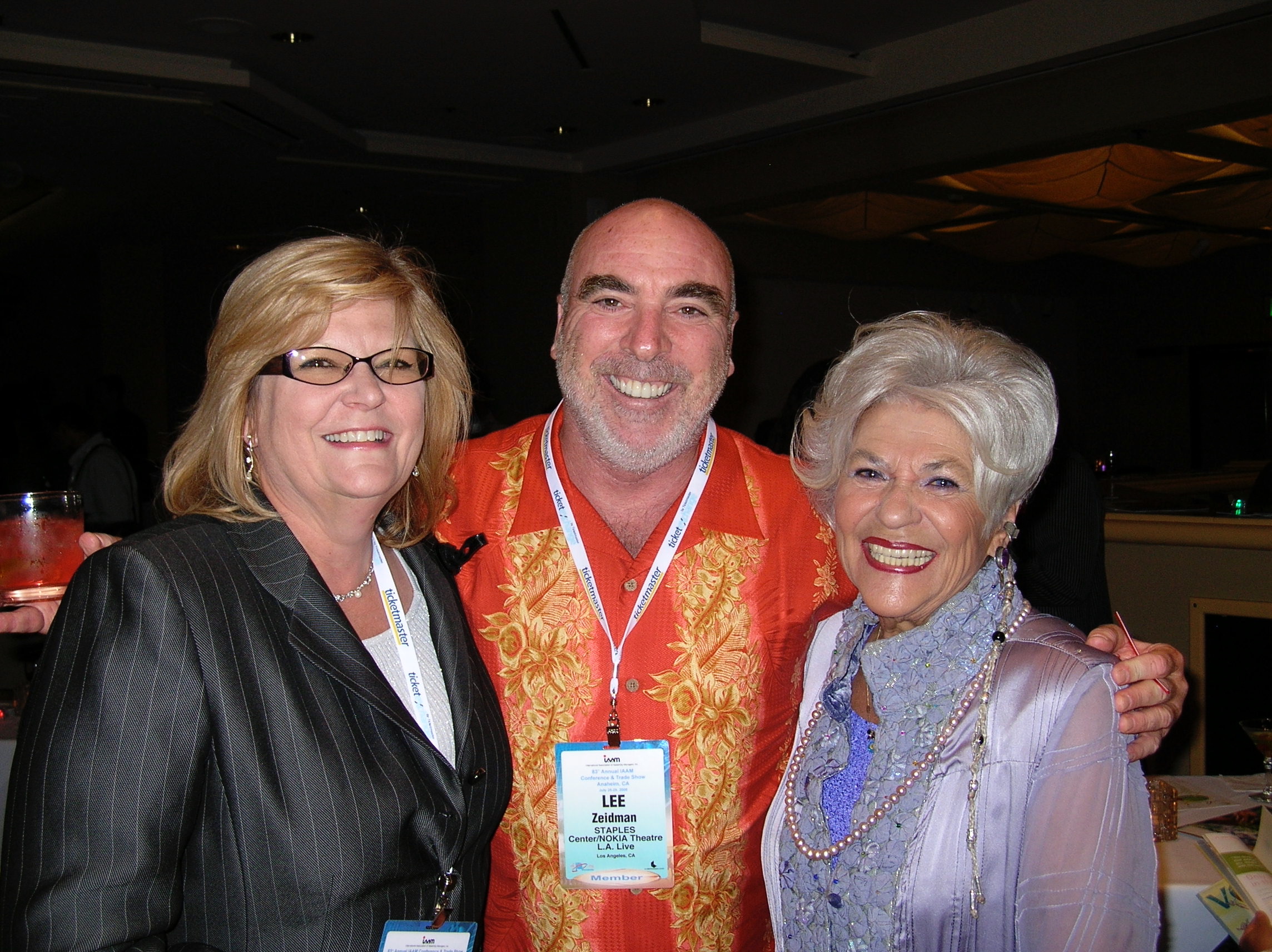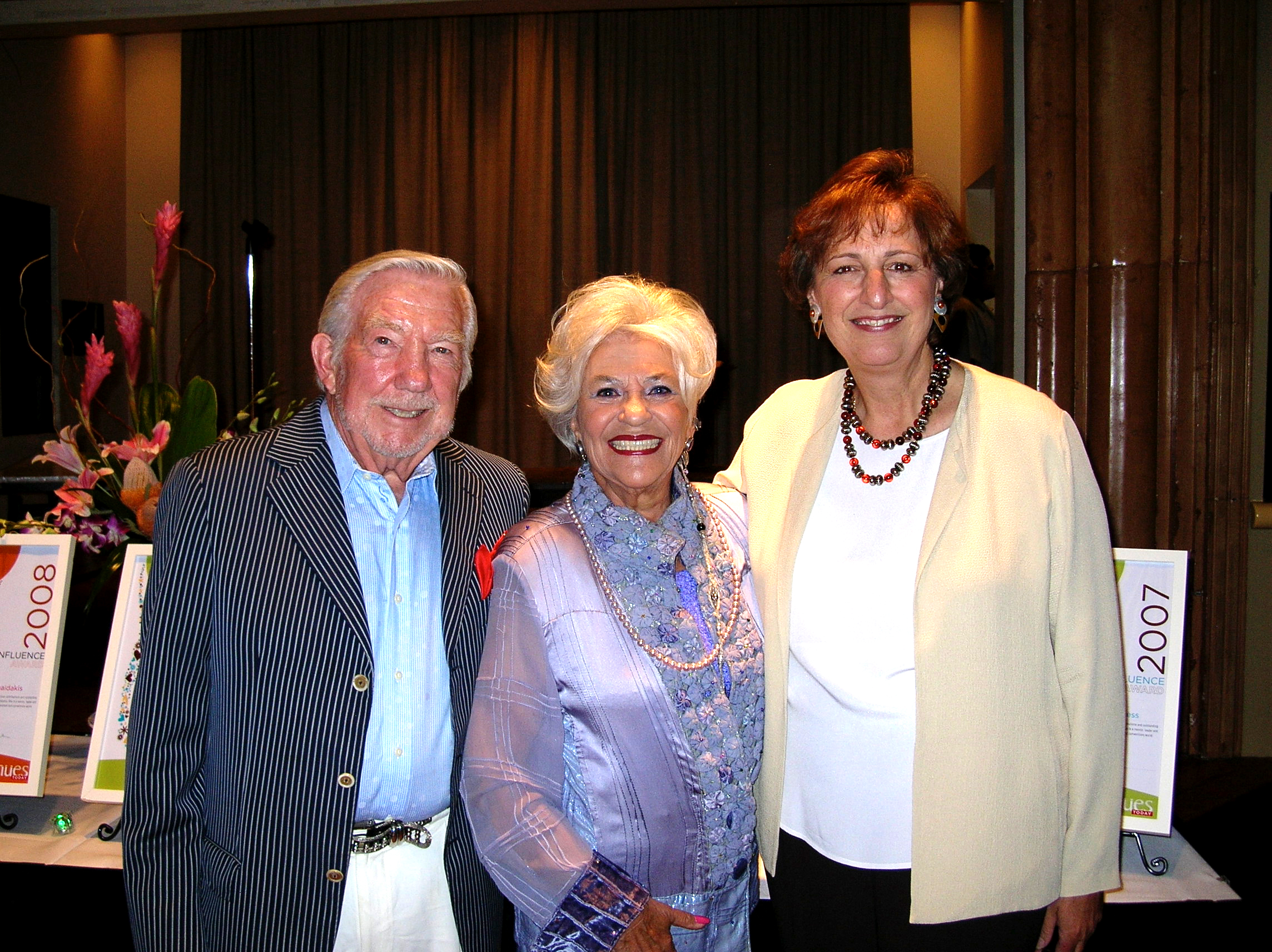Claire Rothman, who managed the Great Western Forum, Inglewood, Calif., for 20 years and led the way for women in the venue industry, died Nov. 22 at the age of 97.
In an extensive interview in 2008, when Rothman was named one of the inaugural Women of Influence by Venues Today magazine (now part of Pollstar), Rothman advised, “You should prepare for your career with your education and experience, and then you should prepare for your retirement with the same zeal.”
And she did. She and her late husband, Edwin Hill, had resided in Las Vegas for the last decade, but she was seen at live sports and entertainment events by friends and associates to the end, usually wearing Lakers purple and several NBA championship rings.
Rothman was featured in the HBO series “Winning Time: The Rise of the Lakers Dynasty,” played by actor Gaby Hoffmann. She had a major role with that franchise during the “Showtime” era when the Lakers won five championships over 10 years. She joined IAVM (then IAAM) in 1969 and was active in the arena and regional meetings, as well as what is now VenueConnect. Many in the industry, including Jeanie Buss, daughter of Lakers owner Jerry Buss, and even NBA star Magic Johnson, considered her a mentor.
“She was a remarkable woman who was tougher than almost all the men I met in this industry,” said Fred Rosen, retired founder and leader of Ticketmaster. “She was highly respected.”
Rosen recalled that when Ticketmaster first took over ticketing at what was then The Fabulous Forum (now Kia Forum) in 1983, “we screwed up a lot. She not only held our feet to the fire — she put them in the fire.” Once during those first six months, a very frustrated Rothman called Rosen and politely asked, “When are you changing the company name to F— itmaster?”
Rothman did not mince words in business, and she was not in Rosen’s pocket, though rumor at the time was rampant that venue managers were being paid by Ticketmaster. That included a persistent rumor that Rosen had bought Rothman a Rolls-Royce, so he bought a model Rolls-Royce, and gave it to her with a note that “now, when people say I sent you a Rolls-Royce, it’s true.”
“She was a giant in the industry,” Rosen said, a sentiment echoed by many who found her tough but supportive.
Mike McGee, CVE, retired, who once ran the Houston Summit, recalled how active Rothman was in the Major Arena Managers Assn. (MAMA), a group that shared critical information about upcoming events and shows. If McGee had a show coming that had had issues with the artist or the audience, Rothman was one of the arena managers he would call to advance the show. She would give him insight, such as knowledge that for some reason, even though it was reserved seating, a third of the audience would show up at 2 p.m., so you’ll need restrooms and water stations outdoors. If it was a crowd prone to rowdiness, she would recommend cutting off alcohol sales early to avoid releasing 16,000 people onto the street, some of whom might be drunk. It was that kind of information arena managers used to, and still do, share, and Rothman was top of the list because L.A. usually had the first shows.
“She could be very tough, especially with people who were disrespectful or tried to take advantage of her,” McGee remembered. Being a woman in this industry in the 80s and 90s was an anomaly. That’s why people like Donna Dowless, XOXO Media, retired from Ticketmaster, revered her so, and considered her a role model, he said.

Brenda Tinnen, Lee Zeidman, and Claire Rothman at the 2008 Venues Today Women of Influence party in Anaheim.
Lee Zeidman, retired from his role leading Crypto.com Arena for AEG, recalls that Rothman was the first to hire him for a major arena job after eight years working at universities. She leaned on him, keeping him on his toes. Three days into his director of ops job at the Forum, Rothman called early in the morning and told him to get down to the arena, which was about to host four nights of the Grateful Dead. The fire department was about to close down the flea market in the parking lot, the celebration the Deadheads held before shows, because there was no potable water out there. Zeidman didn’t yet know where the water hookups were, but he handled it.
On Nov. 7, 1991, he got another unexpected call from Rothman to head in early and get the Forum Club ready for a worldwide press conference, then switch it to host an NHL dinner immediately thereafter. Zeidman did as told, not knowing that the press conference was to be Earvin “Magic” Johnson’s announcement that he had HIV, which was a death sentence at the time. That memory, that moment, still brings him to tears. And that time in history is part of Claire Rothman’s story, too.
She was, throughout her career, the only woman running an NBA/NHL venue and one of the few in a major arena of any kind. She was president and general manager of the Great Western Forum, Inglewood, Calif., home of the Los Angeles Lakers of the NBA and Los Angeles Kings of the NHL, from 1975 to 1995.
She started in the industry at the under-construction Philadelphia Spectrum in 1966, when there were no women running arenas. How did that happen? “It was really a funny story. I was newly divorced, and I was working for a company that manufactured stainless steel kitchen equipment, wonderful people that were so good and generous,” she recalled in that 2008 Venues Today interview. Her neighbor was headhunting for a bookkeeper for the new arena in town, and, though she did not want the job, she accepted an interview for her neighbor’s sake.
“I met Hal Freeman. You know how you meet someone, and you click? He liked to attend to details,” said the detail-oriented Rothman. He offered her the job for $7,000 a year. She countered with $7,500. The rest is history. Ten days into the new job, she was made office manager, and nine months later, business manager.
Freeman was president of the Spectrum, which was built with private funding by a developer named Jerry Wolman, whom Rothman considered a counterpart of Lakers Owner Jerry Buss, her last boss. She felt her life had bookends. The Spectrum, Madison Square Garden in New York, and the Forum all opened in 1967, when the NHL went from six to 12 teams.
Circumstances like a bank loan at seven percent led the Spectrum into bankruptcy. Rothman stayed the course, and five years later, they emerged, paying 100 percent on the dollar. Concerts saved the day, she remembered. Live entertainment was just becoming big business in the early ‘70s. Rothman was able to strike a deal with Electric Factory Concerts, which kept the Spectrum in business.
In her day, the promoter/arena relationship was different. Arenas were generally managed by the in-pocket/out-of-pocket method of finance. Rothman devised a settlement sheet with expense and income details. “I found colored plastic folders. Believe it or not, the folders were the most exciting part about it for the people I settled with.”
Rothman’s toughness in negotiations was renowned, but so was her fairness, common sense, and humorous outlook. Every step of her career, she evaluated the situation realistically. In 1972, she was lured to Orlando by “silly money,” as she put it, to open the Wild Kingdom, which also went bankrupt. As they were auctioning off the animals, Rothman remembered thinking, “Am I the kiss of death?”
Her next stop was Cleveland to open the Coliseum for Charlie Joiwazas, another bean counter and dear friend. When he left, she started looking. Jack Kent Cooke, who owned the Forum at the time, hired her to manage his building. Later, Rothman introduced Cooke to Buss, who was producing a tennis tournament she wanted to book.
At the time, Cooke wanted to sell the Forum and the teams, but he didn’t want to give the buyer any numbers. Buss was about the only businessman who could deal with that, Rothman remembered, and he bought the Forum in 1979. He actually bought the Forum, the Lakers, the Kings, and a ranch from Cooke. He immediately made Rothman vice president and general manager.
In 1995, with rumors of a new arena downtown, which became Staples Center (now Crypto.com Arena), and foreknowledge that Buss would not own the new building, just the Lakers, Rothman moved on to Ticketmaster, where she worked for Rosen from 1995-1999 as executive VP.

Claire Rothman, center, with husband Edwin Hill and Peggy Daidakis in 2008.
Rothman married and had kids before her career in venue management. Her son Barry and daughter Karen were 18 and 16, respectively, when she began that demanding career path. Once she was established at the Forum and felt she could manage without being at the arena 200 nights a year, and because she met the love of her life, she married Hill.
Event management had already changed considerably 20 years ago. Rothman saw no reason an arena manager had to be there for every one of 29 performances of the circus. “You’d go stark raving mad,” she said.
But she didn’t. She managed a major arena with the best of the best and made a lot of friends and memories while inventing a career that everyone can aspire to.
Rothman is survived by her son, daughter, grandchildren, and numerous cousins.
